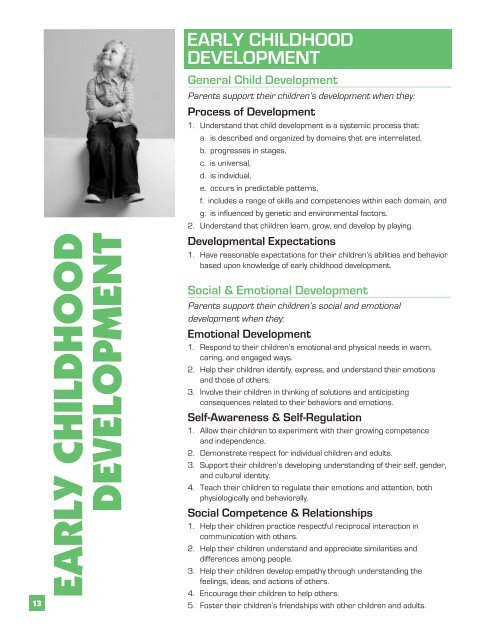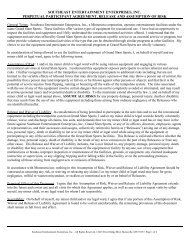Parent Education Core Curriculum Framework 2011.pdf - mnafee
Parent Education Core Curriculum Framework 2011.pdf - mnafee
Parent Education Core Curriculum Framework 2011.pdf - mnafee
You also want an ePaper? Increase the reach of your titles
YUMPU automatically turns print PDFs into web optimized ePapers that Google loves.
13<br />
EARLY CHILDHOOD<br />
DEVELOPMENT<br />
EARLY CHILDHOOD<br />
DEVELOPMENT<br />
General Child Development<br />
<strong>Parent</strong>s support their children’s development when they:<br />
Process of Development<br />
1. Understand that child development is a systemic process that:<br />
a. is described and organized by domains that are interrelated,<br />
b. progresses in stages,<br />
c. is universal,<br />
d. is individual,<br />
e. occurs in predictable patterns,<br />
f. includes a range of skills and competencies within each domain, and<br />
g. is influenced by genetic and environmental factors.<br />
2. Understand that children learn, grow, and develop by playing.<br />
Developmental Expectations<br />
1. Have reasonable expectations for their children’s abilities and behavior<br />
based upon knowledge of early childhood development.<br />
Social & Emotional Development<br />
<strong>Parent</strong>s support their children’s social and emotional<br />
development when they:<br />
Emotional Development<br />
1. Respond to their children’s emotional and physical needs in warm,<br />
caring, and engaged ways.<br />
2. Help their children identify, express, and understand their emotions<br />
and those of others.<br />
3. Involve their children in thinking of solutions and anticipating<br />
consequences related to their behaviors and emotions.<br />
Self-Awareness & Self-Regulation<br />
1. Allow their children to experiment with their growing competence<br />
and independence.<br />
2. Demonstrate respect for individual children and adults.<br />
3. Support their children’s developing understanding of their self, gender,<br />
and cultural identity.<br />
4. Teach their children to regulate their emotions and attention, both<br />
physiologically and behaviorally.<br />
Social Competence & Relationships<br />
1. Help their children practice respectful reciprocal interaction in<br />
communication with others.<br />
2. Help their children understand and appreciate similarities and<br />
differences among people.<br />
3. Help their children develop empathy through understanding the<br />
feelings, ideas, and actions of others.<br />
4. Encourage their children to help others.<br />
5. Foster their children’s friendships with other children and adults.





